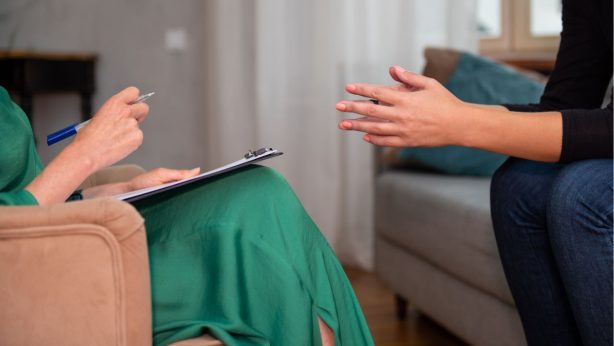How Sexual Violence Impacts Mental Health
Beyond the physical trauma, sexual violence can have intense and long-lasting mental health impacts. In this post, we’ll explore some conditions that are common for survivors of sexual assault and abuse, such as PTSD, anxiety, and depression. We’ll also shed light on the importance of seeking help to support survivors’ healing journey.
Understanding the Mental Health Challenges After Sexual Assault
PTSD
Mental distress often occurs after sexual assault. Post-Traumatic Stress Disorder (PTSD) is one of the frequent consequences. 94% of women who’ve survived rape experience symptoms of PTSD during the two weeks following the assault, and 30% report symptoms nine months later.
The symptoms of PTSD can be very disruptive. They often include frightening or intrusive memories, flashbacks, nightmares, and hyperarousal since the nervous system is constantly on high alert. Survivors may feel on edge all the time and struggle to feel safe.
Anxiety
Anxiety is another common condition for survivors. It often feels like danger is always present and there may be a sense of worry, panic, and doom. This fearfulness and heightened wariness can become overwhelming. Simple tasks or situations may make anxiety worse. This can lead to avoiding and withdrawing from life. Survivors may also have feelings of shame, guilt, and self-blame. These feelings are unjustly fueled by society and make their anxiety symptoms worse.
Depression
Everyone feels sad sometimes, but when someone goes through long periods of sadness and despair, it may be a mood disorder known as depression. A looming sense of hopelessness, loss of interest in favorite activities, and feelings of worthlessness are all signs of depression that may burden survivors. It often gets in the way of daily routines, putting strain on relationships, work, and home life.
Other common mental health struggles that arise after sexual violence are rape trauma syndrome, eating disorders, self-injury/self-harm, dissociation, trust issues, poor self-esteem, and relationship difficulties. No matter what a survivor faces, they don’t have to do it alone! There are different paths to healing, and most start with reaching out for support. Having help can make all the difference.
Breaking the Silence
One of the biggest barriers survivors face is the stigma around sexual violence and mental health. Society’s widespread false ideas about these topics and victim-blaming attitudes can keep survivors from seeking the help they need. We can counter harmful messages with support and compassion. By having open and thoughtful conversations about sexual harm and mental health, we can create an environment where survivors feel empowered to speak out and seek assistance.
If you are a survivor struggling to reach out for help, be kind to yourself. It can feel scary to talk about what happened to you. You are not alone and many people want to support you. You can always start by calling a 24-hour hotline to talk to someone who is ready to listen and give you options for further support. You can remain anonymous, and share as little or as much as you want. These services are free.
The 24/7 sexual assault hotline for Kankakee, Iroquois, and Ford counties in Illinois is 815-932-3322. Nationally, you can call 1-800-656-4673.
Mental Health Counseling for Survivors
One of the most trusted paths toward healing after sexual assault or abuse is mental health counseling or therapy. It is a non-judgmental space for survivors to share and work on their struggles, even those they are uncomfortable sharing with their loved ones.
Trained professionals provide a safe and supportive environment for survivors to recognize how sexual violence has impacted their feelings, relationships, self-esteem, and how they live. Counselors work with them to find healing, address their symptoms, and reclaim control over their lives. It is common for survivors to develop ways, or coping strategies, for dealing with mental health challenges through counseling.
Survivors benefit a lot from finding a therapist or counselor suited to their needs. If you are looking for a mental health professional, ask about their experience working with survivors of sexual harm and how they support clients in working through this specific type of trauma. Rape Crisis Centers offer free counseling to survivors and are a great place to start. Their staff is highly trained and experienced in addressing issues that arise from sexual violence.
You can learn more about Clove Alliance’s free sexual violence counseling services here or by emailing counseling@clovealliance.org. RAINN’s website also has a national directory of service providers for survivors. It can help in your search.
Alongside professional counseling, survivors can benefit from self-care practices such as mindfulness, journaling, exercise, and creative expression. It’s about finding what works for each individual, and counselors can help with this exploration. Building a support network of trusted friends, family members, and support groups can also provide emotional encouragement and validation.
Empowering Recovery
Being aware of the connection between sexual violence and mental health helps to support survivors on their healing journey. So does realizing that reactions to sexual violence and paths to healing are different for every individual. No matter what, you can offer the support survivors need.
Support can come in many forms such as: believing the victim/survivor, actively listening to what they are trying to share about sexual assault, and not judging or blaming them—which can cause more harm. People need time to process what happened to them and have the freedom to make their own decisions about the next steps. An ally’s role is to compassionately listen to what survivors need, advocate with them, and ensure that mental health resources are easy to access. Together, we can empower survivors to reclaim their lives and build a future defined by resilience, strength, and hope.
You can continue to get tips and news about supporting survivors by connecting with Clove Alliance. Join us on social and in your inbox.



